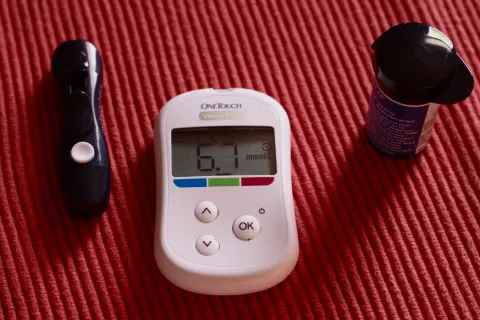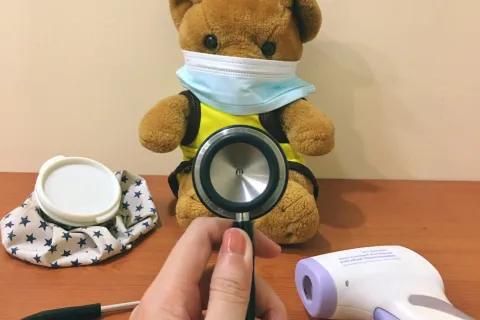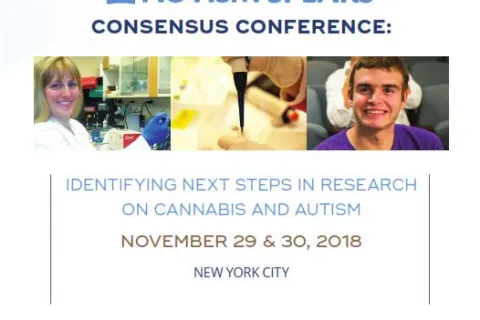Autism and mental health in young people
Autism Speaks research provides guidance on how to identify autistic children at risk of mental health crisis and support them and their care providers
Mental health crises are serious and potentially life-threatening events that frequently affect children, adolescents and adults on the autism spectrum. Beyond the danger of injury or death, these emergencies often result in lost education, employment and residential opportunities, as well as isolation, exhaustion and financial strain on parents and other caregivers.
An Autism Speaks treatment research grant enabled researchers at Baltimore’s Kennedy Krieger Institute to address the urgent need to:
- Better identify mental health crisis – and the risk for it – among young people on the autism spectrum, and
- Better understand how psychiatrists can help these highly vulnerable young people.
The study team, led by mental health researcher Luther Kalb, PhD, and psychiatrist Roma Vasa, MD, recently published the results of their investigations in the Journal of Child Psychology and Psychiatry and Psychiatric Services. Their reports provide mental health providers and policy makers with important new guidance.
Autism Speaks asked Dr. Kalb to answer related questions of interest to the autism community
What is a mental health crisis?
It involves two things. One, an acute psychiatric event – such as attempted suicide, elopement (or wandering), self-injury and/or dangerous impulsivity – that requires immediate intervention. Second, it involves a lack of resources to immediately manage the event. By resources, we mean a parent or other caregiver’s ability to handle the child’s dangerous behavior.
Why are young people with autism at high risk for mental health crisis?
From research and clinical experience, we know that many young people with autism have significant behavioral challenges that include self-injurious behavior, aggression and wandering. And recent research has made clear that suicidal behavior is particularly common among those who without an intellectual disability. These young people also have high rates of psychiatric disorders including anxiety, ADHD and mood disorders.
In addition to these issues, other autism-related health conditions can contribute to crisis episodes. These include disrupted sleep cycles and painful GI disorders.
There is also evidence of unmet needs among young people with autism. We see this in high rates of emergency room visits and inpatient psychiatric hospitalization among youth with autism.
Are there autism-specific treatments for these crises? What are psychologists and psychiatrists doing to address the special needs of people with autism?
Naturally, there is no one treatment for a mental health crisis in any group of people – including those who have autism. Mental health professionals draw from many types of treatments to address each patient’s needs.
At the same time, experts agree that youth with autism likely have special needs in this area. Unfortunately, there are only a few evidenced-based mental health treatments for patients who have autism. These include atypical antipsychotic medications such as risperidone for aggression, cognitive behavioral therapy for anxiety and applied behavior analysis for aggressive, disruptive and self-injurious behaviors. Each of these approaches has limitations, and medications can have severe side-effects.
There is also emerging evidence for the effectiveness of what we call “wrap-around services.” This is where a team, which may include a physician, psychologist and service coordinator, works together to make sure the person’s needs are met in all areas of life, from the home to school or work setting. One related approach is the START program. The acronym stands for Systemic, Therapeutic, Assessment, Resources, Treatment.
Personally, I think we urgently need more accessible, on-call services for families and children in crisis. And we need strategies to prevent a mental health crisis.
As part of our Autism Speaks-funded research, we surveyed 866 psychiatrists across the U.S. about how they managed crises in youth with autism.
We found that psychiatrists who saw youth with autism felt they lacked the professional support they needed when these young patients were in crisis – for example, support from other mental health professionals with special expertise in crisis management or a crisis-evaluation center.
They also had low confidence in the ability of emergency first responders and hospital emergency room staff to manage youth with autism in crisis. I think psychiatrists were telling us exactly what we’ve been hearing from parents: “We need more autism-tailored support services, especially urgent on-the-spot care!”
As part of your research, you created the Mental Health Crisis Assessment Scale (MCAS). What need does it address? How well did it work in your evaluation?
We reviewed the scientific literature to see if a mental health crisis measure had been developed for people who have autism. These measures, or assessments, are important tools for helping professionals and caregivers recognize when someone is at high risk for a mental health crisis – or is even in the middle of a hidden one – for example, a depression that involves thoughts of suicide.
We found nothing out there that reflected what we were seeking. So, Dr. Vasa and I decided to develop one ourselves.
First, we gathered a panel of experts from the fields of pediatrics, social work, public health, psychology and psychiatry, to discuss our concept of crisis and develop the questions that should be in the assessment scale.
Behavioral psychologist Louis Hagopian, an expert in self-injurious behaviors, played a crucial role in developing the assessment questionnaire.
We also invited a group of parent reviewers to help us improve its readability and usability. We then gathered data on the MCAS through the Interactive Autism Network (IAN). [Editor’s note: IAN is an online research project at Kennedy Krieger, originally launched with the support of Autism Speaks in 2006 and now operated in partnership with the Simons Foundation.]
The MCAS asks parents to rate the severity of a range of emotional symptoms and behaviors, as well as their ability to manage their child’s most dangerous behavior. Health care providers also interviewed some of those parents by telephone, to determine if their children were experiencing a mental health crisis.
Next, we analyzed the results of the parent-completed MCAS and the phone interviews. Our analysis found the MCAS to be a "promising tool" to measure mental health crises in children, teenagers and young adults with autism. It worked well and we are excited about its future potential.
What advice do you have for parents and other caregivers?
Autism Speaks has several excellent tool kits for families that I recommend. I recommend the Crisis Intervention Resources page.
Editor’s note: The Autism Speaks Autism Response Team can help people with autism, families and caregivers connect to local resources and information.
What are your next steps for this work?
We are working on a study that will identify the proportion of youth with autism who are in crisis and examine what child and family characteristics increase risk for crisis. We also hope to provide evidence that the MCAS can be used as a screening tool. Right now, the MCAS is only a research tool. We will need to make sure the MCAS can improve clinical care before it is ready for use among providers and caregivers.
We would like to thank Autism Speaks. Without their funding, this study would not have happened. We would also like to thank the families in IAN. We surely could have never developed this measure without their help.









